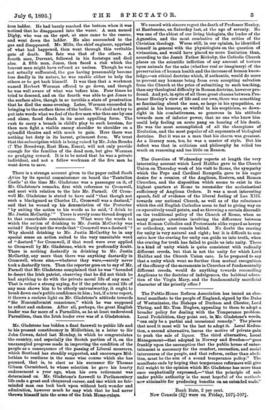There is a strange account given to the paper called
South Africa by its special commissioner on board the Tantallon Castle' at the time Mr. Gladstone was a passenger on it, of Mr. Gladstone's remarks, first with reference to Cromwell, and next with relation to the late Mr. Parnell. Of Crom- well Mr. Gladstone is stated to have said "that though not such a blackguard as Charles II., Cromwell was a dastard," and that he wound up his denunciation of the Protector "by suiting the action to his words as he said, I drink to Mr. Justin McCarthy." There is surely some thread dropped in that remarkable reminiscence. What were the words to which the action of drinking to Mr. Justin McCarthy was suited ? Surely not the words that " Cromwell was a dastard " ? Why should drinking to Mr. Justin McCarthy be in any special sense an action suited to the very unsuitable word of " dastard " for Cromwell, if that word were ever applied to Cromwell by Mr. Gladstone, which we profoundly doubt. There is nothing dastardly in drinking to Ur. Justin McCarthy, any more than there was anything dastardly in Cromwell, whose sins,—whatever they were,—surely never took a dastardly turn. Then the reporter goes on to say of Mr. Parnell that Mr. Gladstone complained that he was "hounded to desert the Irish patriot, observing that he did not think he had anything to do with the private moral life of any man." That is rather a strong saying, for if the private moral life of any man shows him to be utterly untrustworthy, it ought to break down one's public confidence in him; but, if a true report, it throws a curious light on Mr. Gladstone's attitude towards "the Nonconformist conscience," which he was supposed to reflect and endorse. After all, perhaps, the great English leader was far more of a Parnellite, as he at least understood Parnellism, than the Irish leader ever was of a Gladstonian








































 Previous page
Previous page